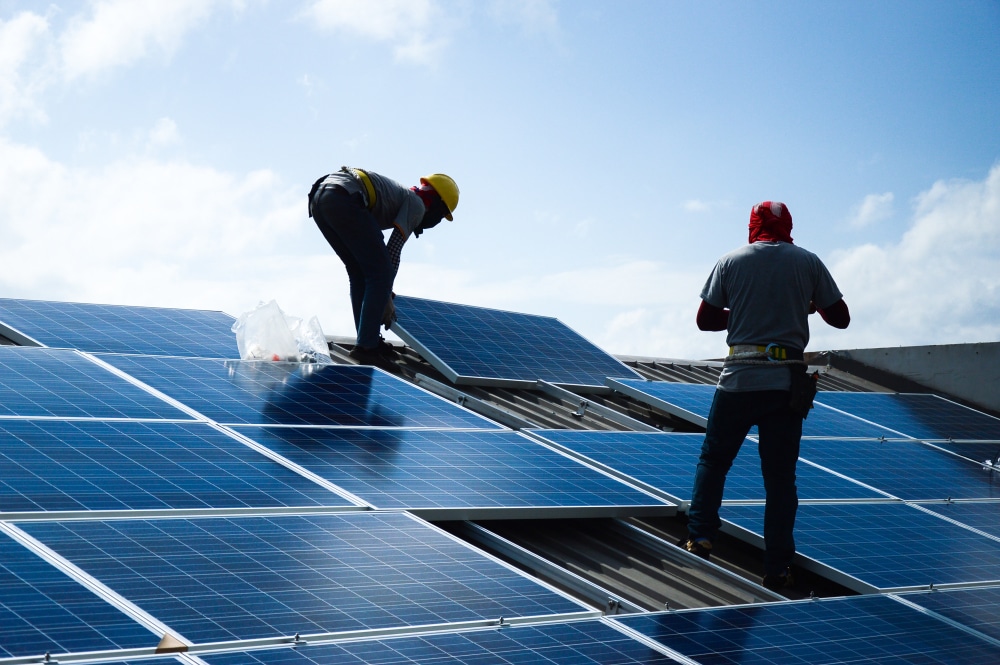Solar panels are one of the best ways to make your home greener, more efficient, and cost-effective. While the solar panels and installation may be pricey depending on who you go to, the amount of money you save on your energy bill may very well have the panels paying for themselves in no time.
A lot goes into ensuring your solar panels are installed correctly and work the way they’re supposed to, but what about your home? Here are a few things to consider before installing solar panels on your roof.
Assessing Your Home & Compatibility
It’s crucial to have a roof compatible with your potential solar panels. That way, both your roof and solar panels can last as long as possible. With a good combination of quality materials and proper maintenance, your roof and solar panels could last for multiple decades or longer.
Roof Maintenance
Inspecting the state of your roof is the first step to solar panel installation. Whether you have qualified roofers do this inspection or start with a simple look-over on your own, you can usually tell if there is a need for repairs or replacement. Here are some basics to look for:
- Missing or warped shingles
- Excessive debris, moss, overgrowth, etc.
- Holes made from weather damage or pests
If you see any of these, it may be wise to enlist the help of a roofing company to come and inspect any problem areas. Putting solar panels on top of a roof that will need repairs or replacement in the near future will cost you more in the long run for the panels needing to be dismantled and reinstalled.
Roof Type & Compatibility
Not all roof types are created equal, and some are less likely to hold solar panels than others effectively. Therefore, when considering solar panels for your home, it’s essential to know what angle your roof slants at–if it slants at all–and how compatible it might be with a solar panel installation.
Here are a few questions to ask yourself or a professional about your roof:
- What is the shape and size of your roof?
This is important because if your roof does not have the right shape or surface area allowance, you might not be able to reap the benefits of solar panels.
- What direction do the slopes face?
This question matters because of both water runoff and the amount of sunlight the panels will be exposed to on a daily basis.
- Can your roof support the weight of solar panels?
Solar panels are heavy equipment, and they need to be supported by your roof. If your roof isn’t capable of holding them up, it could mean significant damage to your home and solar panels.
The Panels & Other Work
There are many companies you might choose from and multiple different solar panel types that could or would be compatible with your home, living situation, energy needs, and more. Therefore, it’s crucial to understand absolutely everything before deciding on any one company or solar panel type. Let’s cover the basics.
The Real Cost of Solar
A lot can factor into your ultimate price point, given how houses come in all shapes, sizes, and energy needs. You’ll have to find a suitable company to assess your solar needs, get an estimate or two, and decide based on your budget.
Choosing something ‘cheap’ will almost always cost you more in the long run. Your upfront costs and monthly expenses will depend on your solar panels’ size, type, and efficiency. The more efficient they are, the higher the upfront price. Likewise, more efficiency means a lower monthly cost of your electricity bill.
There are financial rebates, too, on a federal level. The federal tax credit for solar in residential areas is definitely worth looking into when you have plans underway. Some solar companies also offer their own incentives and rebate programs too.
Longevity & Warranties
As mentioned during the roofing section of this blog, the longevity of the solar panels can largely depend on the installation and what’s underneath them. But the quality of the company installing them and the panels themselves can affect the panels’ longevity in a big way.
Most decent quality solar panels will work at peak capacity for upwards of 20 years, usually deteriorating efficiency after that threshold. How well they’re maintained will affect that 20 years, though. Many warranties will require regular maintenance; then, if something goes wrong, your panels are covered.
Warranties from a company that cares about your solar panels’ quality are generally substantial, offering service to your solar systems without any hassle.
What Are Your Next Steps?
When you’re seriously considering solar panels for your home, your first step is researching companies, costs, and avenues you want to pursue. You’re on the right track if you’ve made it to the end of this blog!
Starting with a roof inspection or any maintenance it might need is what you’ll want to do while you’re shopping around solar companies. At Arrow Roofing, if you let us know that that’s your end goal, we’ll do a thorough check to ensure your roof would be well-suited for solar panels or not. However, we aren’t solar experts–just roofing experts–so be sure to ask any solar inspectors!
When you need the assistance of a top-notch roofing company in the Prescott Valley, AZ area, trust the experts at Arrow Roofing! Drop us a line today for more information.

